2016 年广东暨南大学英语翻译考研真题
I. Vocabulary & Grammar (30%)
Directions: There are 30 sentences in this section. Beneath each sentence there are four words
or phrases marked A, B, C and D. Choose the ONE answer that best completes the sentence.
Write your answers on the Answer Sheet.
1. Whenever possible, Ina ________ how well she speaks Japanese.
A. shows up
B. shows around
C. shows off
D. shows out
2. As the director can’t come to the reception, I’m representing the company________.
A. on his account
B. on his behalf
C. for his part
D. in his interest
3. The price of the coal will vary according to how far it has to be transported and how expensive
the freight ________ are.
A. payments
B. charges
C. funds
D. prices
4. The ball ________ two or three times before rolling down the slope.
A. swayed
B. bounced
C. hopped
D. darted
5. He has been transferred to the University of Maryland Medical Center and is waiting to
________ surgery.
A. undergo
B. unfold
C. underestimate
D. undertake
6. We hold these truths to be self-_______: that all men are created equal.
A. essential
B. eternal
C. evident
D. exquisite
7. The bear clawed the hunter within _______ of his life.
A. close
B. reach
C. a space
D. an inch
8. The third candidate is a ________. She’s new to politics and is just beginning her campaign.
A. white elephant
B. dark horse
C. sleeper
D. big hit
9. We go to the Summer Palace on foot ________.
�
A. on purpose
B. on occasions
C. on behalf
D. on trial
10. It was cloudy this morning, but it ________ fine.
A. turned on
B. turned over
C. turned up
D. turned out
11. In his ________ to further knowledge of the universe, man has now begun to explore space.
A. attempt
B. expedition
C. trial
D. chase
12. The bus moved slowly in the thick fog. We arrived at our ________ almost two hours later.
A. designation
B. destiny
C. destination
D. dignity
13. The nuclear family ________ a self-contained, self-satisfying unit composed of father,
mother and children.
A. refers to
B. defines
C. describes
D. devotes to
14. Some polls show that roughly two-thirds of the general public believe that elderly Americans
are ________ by social isolation and loneliness.
A. reproached
B. favored
C. plagued
D. reprehended
15. The Pacific island attracts shoals of tourists with its rich ________ of folk arts.
A. heritage
B. heredity
C. heroism
D. hermitage
16. It is imperative that students ________ their term papers on time.
A. handing in
B. handed in
C. hand in
D. would hand in
17. An old woman was badly hurt in ________ the police describe as an apparently motiveless
attack.
A. that
B. which
C. what
D. whatever
18. ________ on a clear day, far from the city crowds, the mountains give him a sense of infinite
peace.
A. If walking
B. While walking
C. Walking
D. When one is walking
19. After the Arab states won independence, great emphasis was laid on expanding education,
�
with girls as well boys ________ to go to school.
A. to be encouraged
B. been encouraged
C. being encouraged
D. be encouraged
20. Joan didn’t go to the party last night because she ________ the baby for her sister until
9:30.
A. must have looked after
B. would have to looked after
C. had to look after
D. should have looked after
21. We are going to London next month. This will be the first time I ________ there.
A. have traveled
B. travel
C. will travel
D. am traveling
22. John is ________ hardworking than his sister, but he failed in the exam.
A. no less
B. no more
C. not less
D. no so
23. Americans eat ________ as they actually need every day.
A. twice as much protein
B. twice protein as much twice
C. twice protein as much
D. protein as twice much
24. Who ________ was coming to see me in my office this afternoon?
A. you said
B. did you say
C. did you say that
D. you did say
25. She would have been more agreeable if she had changed a little bit, ________?
A. hadn’t she
B. hasn’t she
C. wouldn’t she
D. didn’t she
26. ________ you ________ further problems with your printer, contact your dealer for advice.
A. If; had
B. Have; had
C. Should; have
D. In case; had
27. ________ we wish him prosperous, we have objections to his ways of obtaining wealth.
A. Much as
B. As much
C. More as
D.As well as
28. Among the first to come and live in North America ________, who later prospered mainly in
�
New England.
A. had been Dutch settlers
B. Dutch settlers were there
C. were Dutch settlers
D. Dutch settlers had been there
29. _______ there was an epidemic approaching, Mr. Smith ________ the invitation to visit that
area.
A. If he knew; would have declined
B. If he had known; would decline
C. Had he known; would decline
D. Had he known; would have declined
30. In the dark they could not see anything clear, but could ________.
A. hear somebody mourn
B. hear somebody mourning
C. hear somebody mourned
D. hear somebody had been mourning
II. Reading Comprehension (40%)
Directions: This part consists of two sections. In Section A, there are three passages followed by
a total of 15 multiple-choice questions. In Section B, there is one passage followed by a total of 5
short-answer questions. Read the passages and write your answers on the Answer Sheet.
Section A Multiple-Choice Questions (30%)
Passage 1
Questions 31 to 35 are based on the following passage.
The head of the Library of Congress is to name Donald Hall, a writer whose deceptively simple
language builds on images of the New England landscape, as the nation’s 14th poet laureate
today.
Mr. Hall,a poet in the distinctive American tradition of Robert Frost, has also been a harsh critic
of the religious right’s influence on government arts policy. And as a member of the advisory
council of the National Endowment for the Arts during the administration of George H. W. Bush,
he referred to those he thought were interfering with arts grants as “bullies and art bashers”.
He will succeed Ted Kooser, the Nebraskan who has been the poet laureate since 2004.
The announcement of Mr. Hall’s appointment is to be made by James H. Billington, the Librarian
of Congress. Mr. Billington said that he chose Mr. Hall because of “the sustained quality of his
�
poetry, the reach and the variety of things he talks about”. Like Mr. Kooser, Mr. Billington said,
“Mr. Hall evokes a sense of place. ”
Mr. Hall, 77, lives in a white clapboard farmhouse in Wilmot, N. H., that has been in his family for
generations. He said in a telephone interview that he didn’t see the poet laureateship as a bully
pulpit. “But it’s a pulpit anyway,” he said. “If I see First Amendment violations, I will speak
up.’’
Mr. Hall is an extremely productive writer who has published about 18 books of poetry, 20 books
of prose and 12 children’s books. He has won many awards, including a national Book Critics
Circle Award in 1989 for “The One Day”,a collection.
In recent years much of his poetry has been preoccupied with the death of his wife, the poet
Jane Kenyon, in 1995.
Robert Pinsky, who was poet laureate from 1997 to 2000 said he welcomed Mr. Hall ’ s
appointment,especially in light of his previous outspokenness about politics and arts. “There is
something nicely symbolic,and maybe surprising,” Mr. Pinsky said, “that they have selected
someone who has taken a stand for freedom.”
The position carries an award of $35,000 and $5,000 travel allowance. It usually lasts a year,
though poets are sometimes reappointed.
31. Donald Hall ________.
A. uses simple English to express the images of the New England landscape
B. dislikes the idea of impacting government by the right side of the religion
C. is the 14th poet laureate appointed by the Congress
D. is a member of the advisory council of the National Endowment for the Arts
32. James H. Billington ________.
A. likes the poems with great depth and width
B. speaks highly of poems in simple English rather than complex ones
C. prefers the poems with sustained style and expression
D. likes the poems with the knowledge of various things
33. Which of the following is TRUE according to the passage?
�
A. Mr. Hall has published many books and magazines on poems.
B. Mr. Hall is a critic of literature in the U. S.
C. Mr. Hall has got many prizes for his talents in writing.
D. Mr. Hall has got support from his predecessors.
34. What can be inferred from the passage?
A. Mr. Hall loves his wife very much.
B. Mr. Hall takes the new appointment for granted.
C. Mr. Hall has got great ideas from his wife.
D. Mr. Hall may hold the position for another year.
35. What is the best title for the passage?
A. A Guard for Politics and Arts
B. A New Poet Laureate
C. A Representative for Freedom
D. The Winning of a Poet
Passage 2
Questions 36 to 40 are based on the following passage.
Most of us are taught to pay attention to what is said—the words. Words do provide us with
some information, but meanings are derived from so many other sources that it would hinder
our effectiveness as a partner to a relationship to rely too heavily on words alone. Words are
used to describe only a small part of the many ideas we associate with any given message.
Sometimes we can gain insight into some of those associations if we listen for more than words.
We don’t always say what we mean or mean what we say. Sometimes our words don’t mean
anything except “I’m letting off some steam. I don’t really want you to pay close attention to
what I’m saying. Just pay attention to what I’m feeling.” Mostly we mean several things at
once. A person wanting to purchase a house says to the current owner, “This step has to be
fixed before I’ll buy.” The owner says, “It’s been like that for years.” Actually, the step hasn’
t been like that for years, but the unspoken message is: “I don’t want to fix it. We put up with
it. Why can ’t you? ” The search for a more expansive view of meaning can be developed
through examining a message in terms of who said it, when it occurred, the related conditions or
situation, and how it was said.
�
When a message occurs can also reveal associated meaning. Let us assume two couples do
exactly the same amount of kissing and arguing. But one couple always kisses after an argument
and the other couple always argues after a kiss. The ordering of the behaviors may mean a great
deal more than the frequency of the behavior. A friend’s unusually docile behavior may only be
understood by noting that it was preceded by situations that required an abnormal amount of
assertiveness. Some responses may be directly linked to a developing pattern of responses and
defy logic. For example, a person who says “No!” to a serials of charges like “You’re dumb,”
“You’re lazy,” and “You’re dishonest,” may also say “No!” and try to justify his or her
response if the next statement is “And you’re good looking.”
We would do well to listen for how messages are presented. The words, “If sure has been nice
to have you over,”can be said with emphasis and excitement or ritualistically. The phrase can be
said once or repeated several times. And the meanings we associate with the phrase will change
accordingly. Sometimes if we say something infrequently it assumes more importance;
sometimes the more we say something the less importance it assumes.
36. Effective communication is rendered possible between two conversing partners, if ________.
A. they use proper words to carry their ideas
B. they both speak truly of their own feelings
C. they try to understand each other’s ideas beyond words
D. they are capable of associating meaning with their words
37. “I’m letting off some steam” in paragraph 1 means ________.
A. I’m just calling your attention
B. I’m just kidding
C. I’m just saying the opposite
D. I’m just giving off some sound
38. The house-owner’s example shows that he actually means ________.
A. the step has been like that for years
B. he doesn’t think it necessary to fix the step
C. the condition of the step is only a minor fault
�
D. the cost involved in the fixing should be shared
39. Some responses and behaviors may appear very illogical, but are justifiable if ________.
A. linked to an abnormal amount of assertiveness
B. seen as one’s habitual pattern of behavior
C. taken as part of an ordering sequence
D. expressed to a series of charges
40. The word “ritualistically” in the last paragraph equals something done ________.
A. without true intention
B. light-heartedly
C. in a way of ceremony
D. with less emphasis
Passage 3
Questions 41 to 45 are based on the following passage:
Cellular slime molds are extraordinary life forms that exhibit features of both fungi and protozoa,
although often classed for convenience with fungi. At one time they were regarded as organisms
of ambiguous taxonomic status, but more recent analysis of DNA sequences has shown that
slime molds should be regarded as inhabiting their own separate kingdom.
Their uniqueness lies in their unusual life cycle, which alternates between a feeding stage in
which the organism is essentially unicellular and a reproductive stage in which the organism
adopts a multicellular structure. At the first stage they are free-living, separate amoebae, usually
inhabiting the forest floor and ingesting bacteria found in rotting wood, dung, or damp soil. But
their food supplies are relatively easily exhausted since the cells’ movements are restricted and
their food requirements rather large.
When the cells become starved of nutrition, the organism initiates a new genetic program that
permits the cells to eventually find a new, food-rich environment. At this point, the single-celled
amoebae combine together to form what will eventually become a multicellular creature. The
mechanism by which the individual members become a single entity is essentially chemical in
nature. At first, a few of the amoebae start to produce periodic chemical pulses that are
detected, amplified, and relayed to the surrounding members, which then move toward the
�
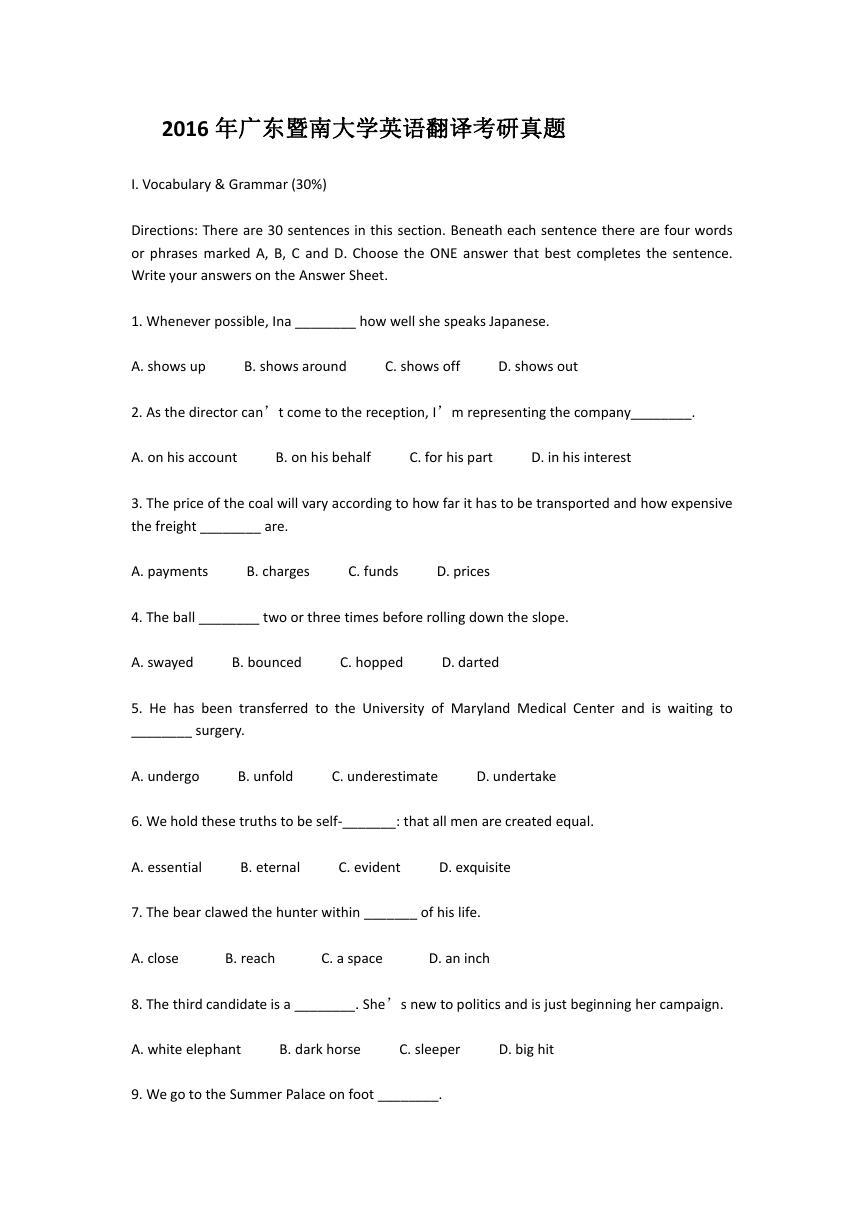
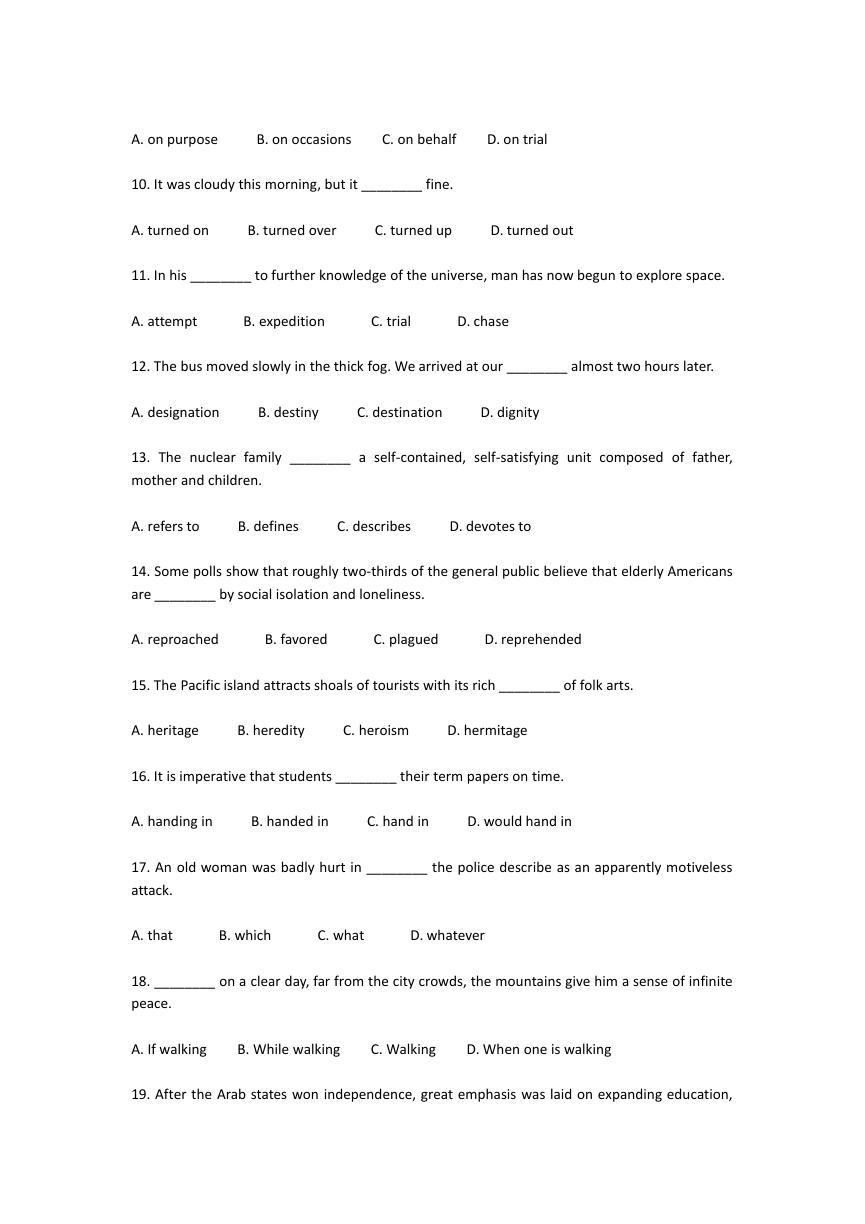

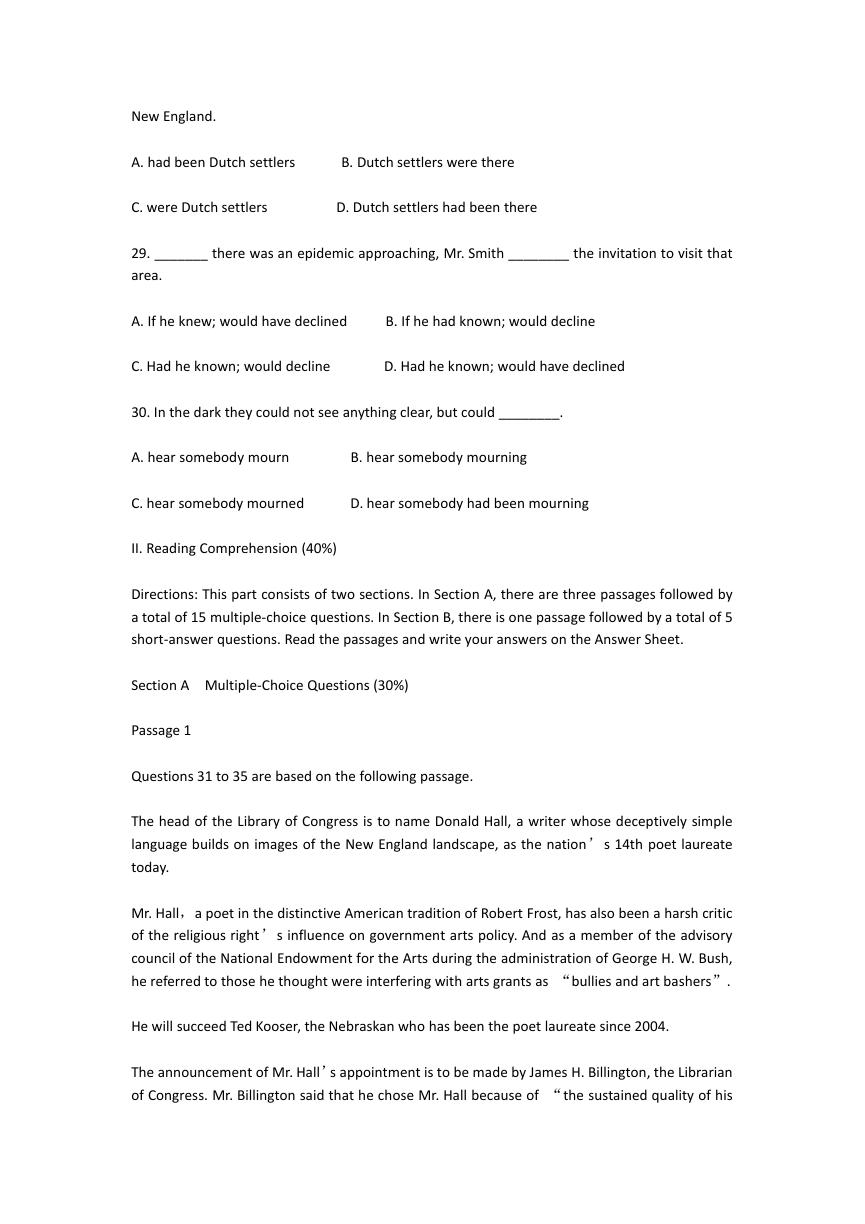
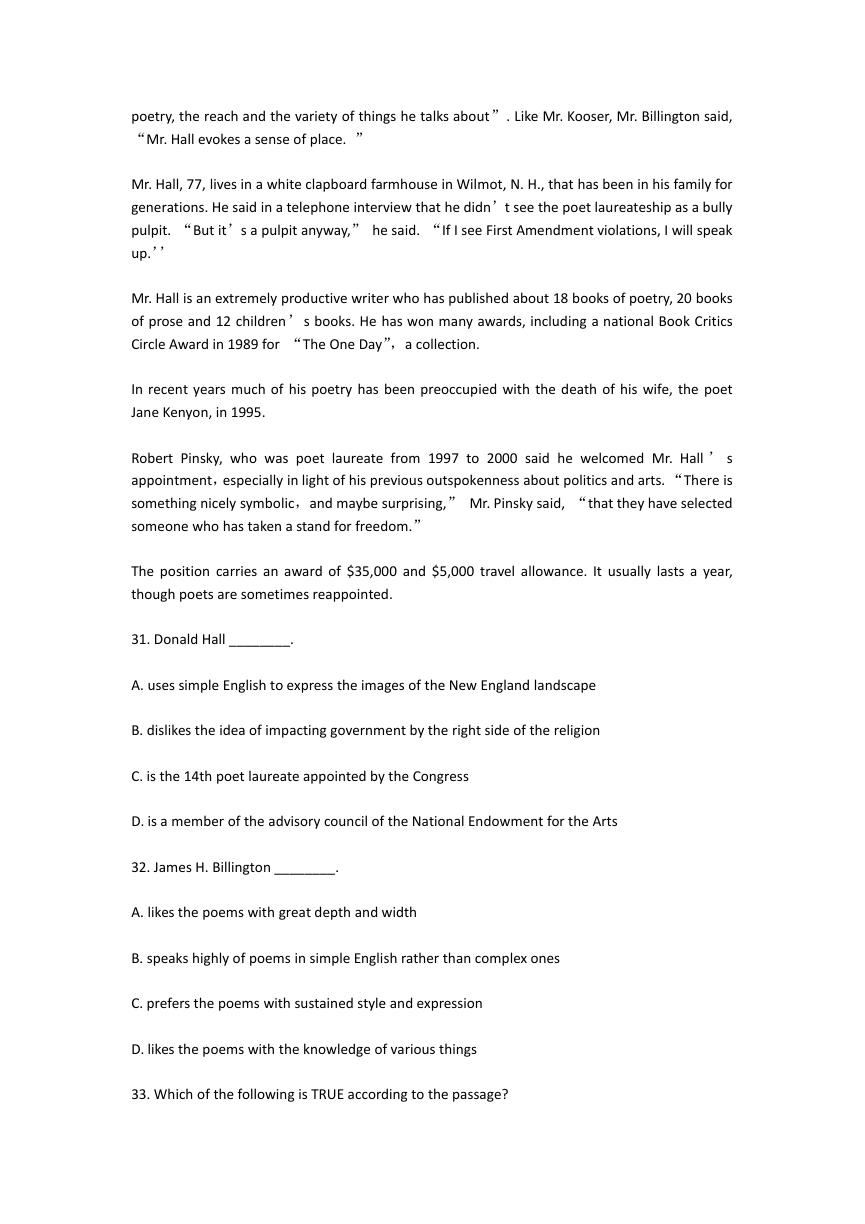
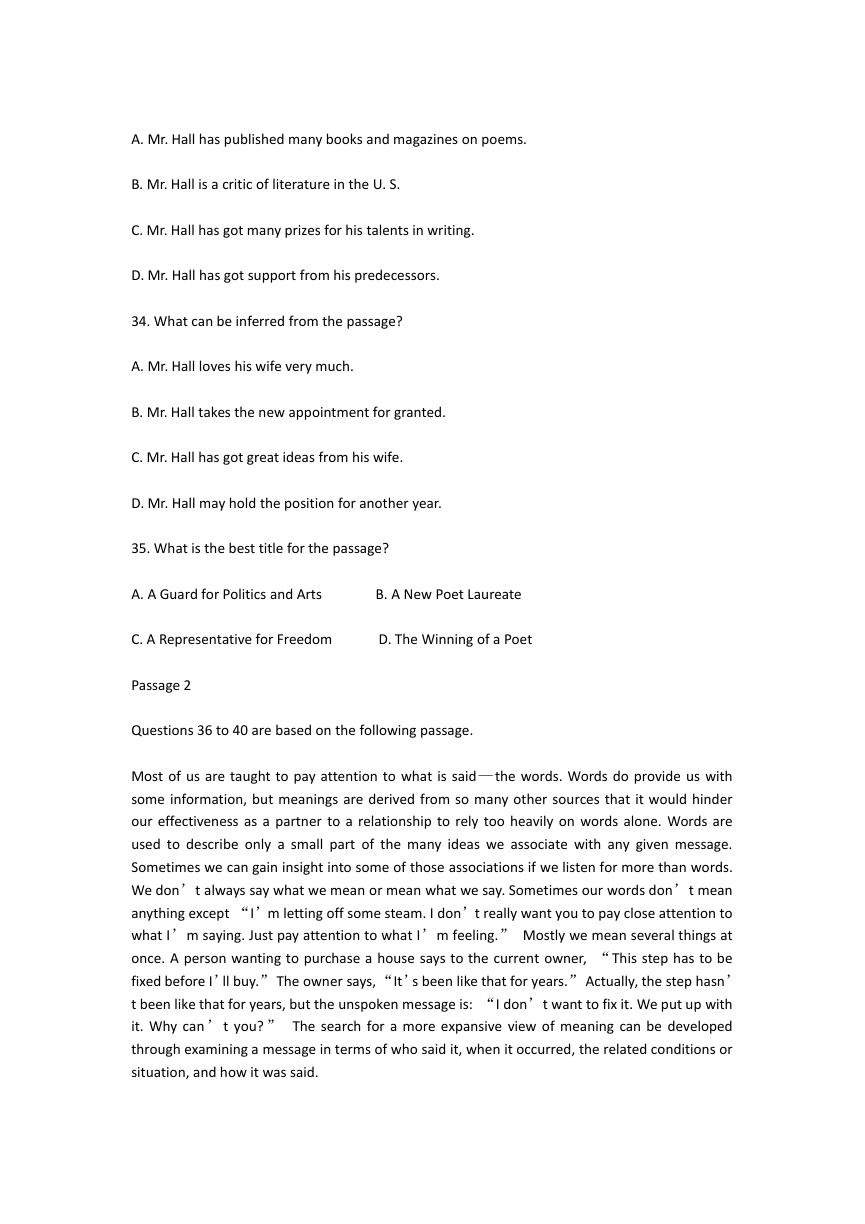
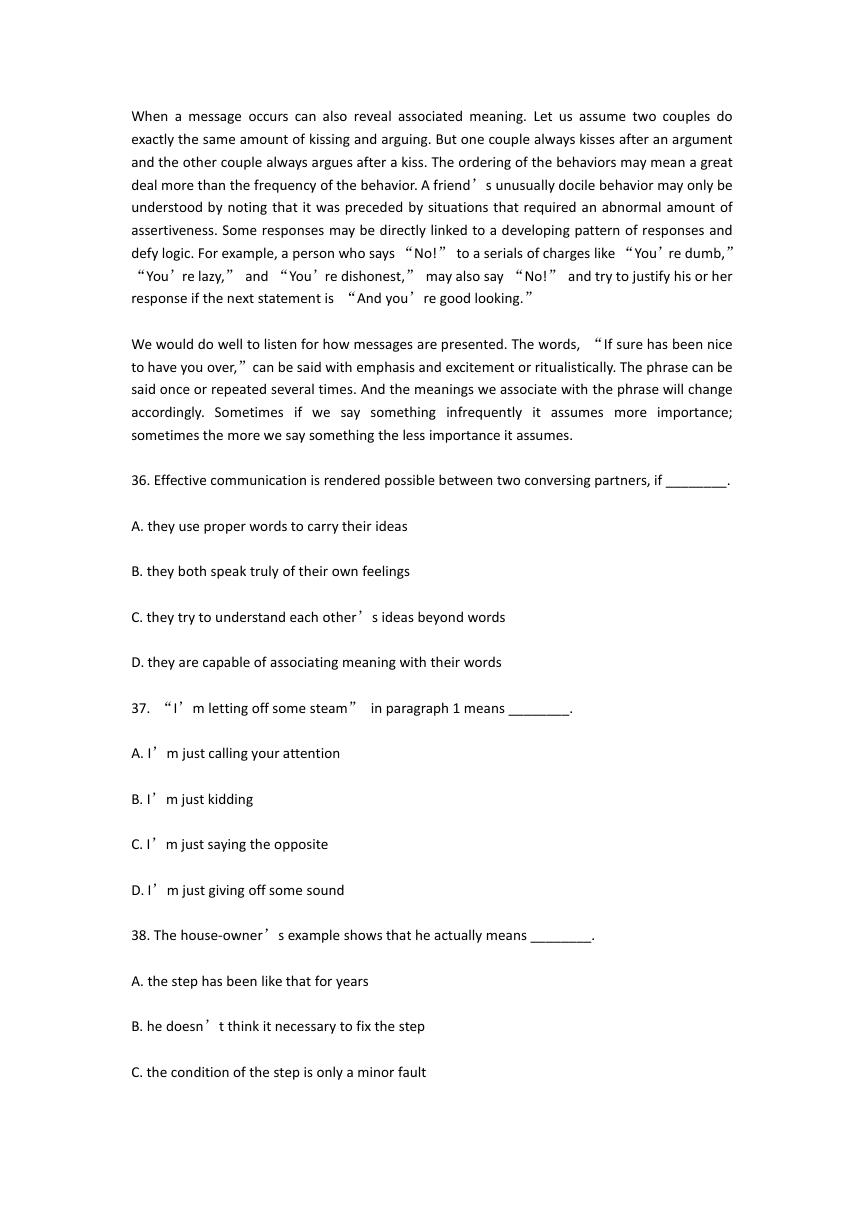
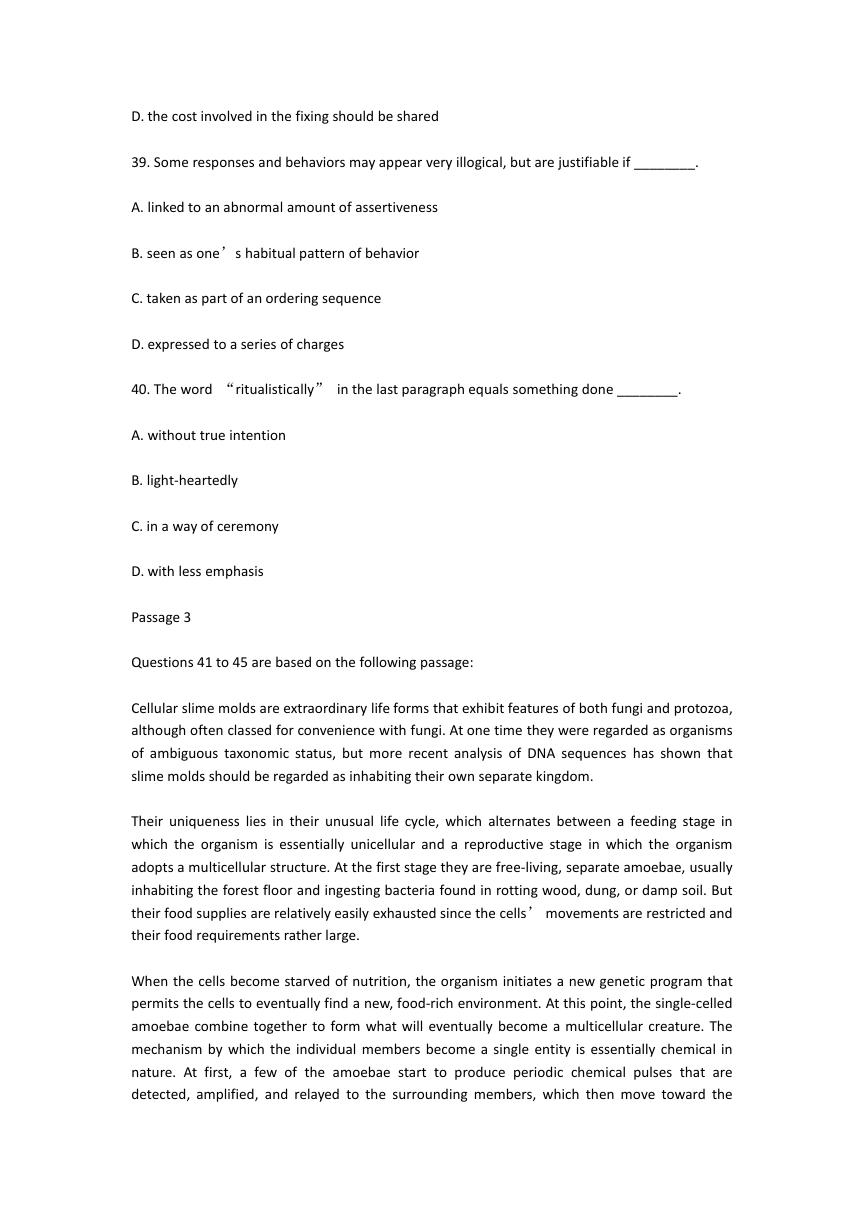








 2023年江西萍乡中考道德与法治真题及答案.doc
2023年江西萍乡中考道德与法治真题及答案.doc 2012年重庆南川中考生物真题及答案.doc
2012年重庆南川中考生物真题及答案.doc 2013年江西师范大学地理学综合及文艺理论基础考研真题.doc
2013年江西师范大学地理学综合及文艺理论基础考研真题.doc 2020年四川甘孜小升初语文真题及答案I卷.doc
2020年四川甘孜小升初语文真题及答案I卷.doc 2020年注册岩土工程师专业基础考试真题及答案.doc
2020年注册岩土工程师专业基础考试真题及答案.doc 2023-2024学年福建省厦门市九年级上学期数学月考试题及答案.doc
2023-2024学年福建省厦门市九年级上学期数学月考试题及答案.doc 2021-2022学年辽宁省沈阳市大东区九年级上学期语文期末试题及答案.doc
2021-2022学年辽宁省沈阳市大东区九年级上学期语文期末试题及答案.doc 2022-2023学年北京东城区初三第一学期物理期末试卷及答案.doc
2022-2023学年北京东城区初三第一学期物理期末试卷及答案.doc 2018上半年江西教师资格初中地理学科知识与教学能力真题及答案.doc
2018上半年江西教师资格初中地理学科知识与教学能力真题及答案.doc 2012年河北国家公务员申论考试真题及答案-省级.doc
2012年河北国家公务员申论考试真题及答案-省级.doc 2020-2021学年江苏省扬州市江都区邵樊片九年级上学期数学第一次质量检测试题及答案.doc
2020-2021学年江苏省扬州市江都区邵樊片九年级上学期数学第一次质量检测试题及答案.doc 2022下半年黑龙江教师资格证中学综合素质真题及答案.doc
2022下半年黑龙江教师资格证中学综合素质真题及答案.doc